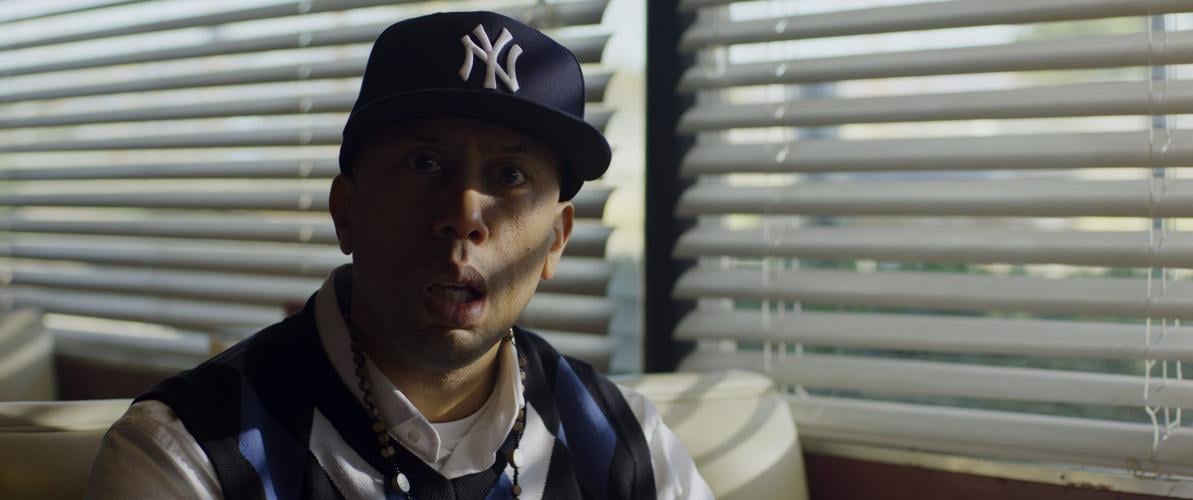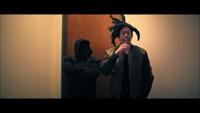Affion Crockett is a comedian who got his start on HBO's Def Comedy Jam (1992), a series created by Russell Simmons, the record executive who co-founded the hip-hop label, Def Jam Recordings in 1984 with Rick Rubin. Simmons and Rubin worked with such music acts as Run DMC, Public Enemy, LL Cool J, Jay-Z, DMX and Kanye West. In this film, Crockett plays a character that is highly inspired by the life of Russell Simmons, if not exactly copied. The only difference is Crockett's character is named "Roscoe Simons." Otherwise, Crockett mimics Simmons' look and speech patterns.
The first half of this film tells how rap music or hip hop as a genre came to be. It's rap music's origins, but done so through the perspective or vantage point of Simmons' character. Most attribute the beginning of hip hop to the summer of 1973 in the Bronx, so this past year marks the 50th anniversary, and, as a tribute or celebration of that 50th, this film walks us through pivotal moments. Yet, the film is a spoof or parody. It's like a Saturday Night Live sketch stretched out too far. It's comparable to Mel Brooks' spoofs, such as Blazing Saddles (1975) or Young Frankenstein (1975). With the presence of a couple of the members of the Wayans' family, this film could also be compared to Keenan Ivory Wayans' Scary Movie (2000) or I'm Gonna Git You Sucka (1988). Brooks and Wayans' films tended to make fun of certain genres of films, Crockett though makes fun of a type of music and specifically one or two people within that music.

When Crockett conceived this project, he probably also had Eddie Murphy in mind. Like Murphy in Coming to America (1988), Crockett plays multiple characters and often in the same scene. For example, the other character he plays is a parody of rapper and mogul, Jay-Z. Crockett's version is named "Jay-B." Often, the scenes consist of Crockett bouncing off himself or riffing with other actors spoofing other famous rappers. Mostly, the parodies make fun of how these so-called rappers spoke or the kind of women they liked, which isn't much of a joke. It's not jokes that are substantive.
It's not clear when Crockett wrote this, but his film side steps a lot of the controversies, concerning Russell Simmons in his personal life, which did bleed over into his professional one. Simmons was accused of sexual harassment, assault and rape, starting in 2017. In total, 13 women accused Simmons of misconduct, including six who alleged he raped them. Simmons had to step down from his businesses. As of February 2024, lawsuits were still being filed against him. Crockett completely ignores these allegations.

It's highly awkward because Crockett's version of Simmons is the protagonist here who by the end becomes a kind of hero. It's awkward, if not offensive to make a rapist a hero. Arguably, Crockett is critical of Simmons but only for his lack of involvement or his ignorance of how the hip hop genre has progressed or where it is now. Crockett argues in general that rap music was great when it first began and the best rappers are those who have been doing it for over 30 or 40 years.
Crockett reinforces that younger rappers aren't as good as the older ones. To be fair, he also criticizes the older ones who have lost touch or don't do it as well as they used to do it. Yet, he almost paints a picture that there aren't any good rappers under the age of 35. The film denies the great work of Chance the Rapper, Vince Staples, Tyler the Creator, Lil Nas X, Wale or Kendrick Lamar. Crockett's film does make fun of what's called "mumble rap" or rappers who have a lack of lyricism or songs with nothing substantive to say. Crockett's critiques are also ones that have been leveled since its inception, that of hip hop glorifying violence and ghetto life.

In various ways, Crockett is making the same critique that Cord Jefferson did in American Fiction (2023). A similar point was also made in Sanaa Lathan's On the Come Up (2022), which went to a greater issue of rappers pretending to rap about violence and ghetto life, even though it's not true to their authentic life. They do so only because it's believed that that's what sells records. Criticizing that issue is absolutely a valid point to make, but Crockett obviously ignores a lot.
What's telling are the rappers Crockett ignores. For example, Kendrick Lamar or a parody equivalent is nowhere to be found. Crockett puts together a song at the end featuring a bunch of rappers. Yet, none of them are female. He has actresses who spoof various female MCs like MC Lyte, Queen Latifah and Salt N' Pepa. Yet, none of those women make it into the final song at the end. Why?

Yes, there are legitimate criticisms of things in hip hop, such as mumble rap or the trap genre, but that doesn't give a full picture. Crockett tries to be comprehensive, but a lot of what he shows here still feels narrow. I did like the scene involving 45 Cent, the parody of rapper 50 Cent.
Not Rated but for mature audiences.
Running Time: 1 hr. and 30 mins.
In theaters.












